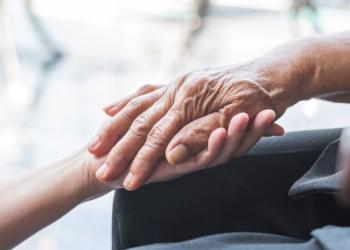
- Vol 33 No 11
- Volume 33
- Issue 11
The Patient’s Son Is Normal
"You just never think people like that can have normal children.” And then I I think of when I was 14 years old and answered a late-night phone call at home.
It’s a slow night during the third week of my internal medicine rotation, and I am sitting in a small windowless workroom with my resident. While I am intermittently glancing at the clock and finishing small tasks left over from the day, the phone rings and delivers a request from the ER: please come admit “Jim,” a 65-year-old man who was found alone in his home by EMS. As the enthusiastic medical student, I head down immediately to begin working on a thorough history and physical exam.
The paramedics tell me that Jim’s neighbor called 911 after not seeing him for a few days. They live in a mobile home community and noted that it was strange not to see him outside given the small distance between their homes. After knocking on the door and hearing only pained grunts in return, the paramedics entered and found Jim on his couch surrounded by empty liquor bottles and beer cans, soiled from lying in place for days.
I enter Jim’s room, and my eyes water because of an overwhelming smell that burns my nostrils. Among the blankets I find him sitting up slightly, his skin tinged yellow and clinging tightly to his bones, with a bulging belly impregnated with fluid. He is in bad condition, alternating in and out of consciousness and only able to answer a few yes or no questions.
In the absence of a responsive patient, I click open endless tabs on the computer to sort through previous admissions. Jim is a Vietnam veteran who has been drinking heavily ever since he returned from overseas.
My resident calls Jim’s son to inform him of the seriousness of the situation-Jim probably would have died if his neighbor hadn’t called. His son is not surprised. He seems comfortable receiving this news, answering questions in a manner that suggests he might have done this several times in the past. The resident discusses care plan options, hangs up, and begins typing. A couple minutes go by and he looks up.
“You know what’s crazy? His son is so normal,” he says. “He’s a successful businessman out in California. You just never think people like that can have normal children.” He shakes his head in a way that says “now I’ve seen it all.”
I lean back in my chair and nod in agreement, wait for him to return to his typing, and stare hard at the floor.
I think of when I was 14 years old and answered a late-night phone call at home.
“Stefanie? This is Officer Peterson-your mother is making another scene at Rudy’s Bar. If you don’t come get her, I’ll have to take her in.”
I let out a sigh, find my shoes, and start walking. I find her standing outside the bar, her balance maintained only by the officer’s hand. She is sheepish toward me; her face is grimaced and displays an emotion somewhere between anger and embarrassment. I can tell she’s had a few too many, and evidence of this is spilled across her shirt. A quick search of the bar and I find her purse slung over a chair, its contents spilled across the floor. The officer-eager to be relieved of this responsibility-nods and leaves.
I find her keys in the mess and guide her to the back door of her old white Ford. She crawls in and slumps across the seat. The car’s paint is chipped and the sides are dented, revealing small patches of rust and rot. I remember when the car was kept clean, free from these blemishes. I climb into the driver’s side, pull the seat as far forward as it goes, and kick some bottles away from the gas pedal. I adjust the mirrors and see that the police are well out of sight, so I start the car and drive my mom home. I put her in bed and lie down next to her, listening to make sure she continues to breathe into the morning hours.
Ten years later I am in medical school studying the day before a big exam. I glance at my silenced phone to find 4 missed calls-3 big brothers and 1 dad. Figuring standard family drama, I call my brother Eric. No one had heard from Mom in a few days, and her sister called 911. EMS found her on the couch barely clothed, in her own filth, surrounded by various bottles of liquor. She was taken to the local ER after the detox center refused to accept her because of an abnormal heart rhythm. After a couple hours of sobering up, she was given a bus pass and sent home at 3:00 am. The next morning my mom was found dead on the couch surrounded by her vices.
While Jim was admitted to the hospital at his worst moment and seen by countless physicians, my mom was sent home. I sometimes wonder if my mom had been admitted as well, would she still be alive? I don’t know.
I don’t blame anyone for my mom dying. I realize there are countless factors that play into cases like this, and I don’t fault any of the physicians who saw her that night. But being on Jim’s treatment team so soon after her death was difficult, as was talking to his family members. The stigma of alcoholics and their families is persistent and unrelenting. Worse, the stereotypes that fuel this stigma often play out in similar patterns again and again.
Back in the present I look around at the rounding team. Everyone is still impressed Jim’s son turned out “so normal.”
My white coat is freshly cleaned, my stethoscope swinging back and forth as I walk from room to room. I have a little book in my pocket that contains an enormous amount of medical knowledge I am trying to somehow fit in my head. I wonder what my team would think if they knew about my family. Would they be equally impressed with me being “so normal” and exclaim, “She’s even going to be a doctor!”
A week later I walk into Jim’s room, but now he has a fresh set of clothing and a new haircut. His abdomen has returned to a smaller size. He can now join a conversation and is planning to go into treatment again for his alcohol addiction. I nod. I have heard this story many times.
I’m not sure if he will indeed go through with this plan, or if he does, how long he will stay sober. I reflect on the careful balance between cynicism and optimism that often accompanies knowing alcoholics. But today I am content. Regardless of what Jim may ultimately do, I know we’re giving him another shot to try, and I find a simple peace with this. I am hopeful that this is the last time I see him in this setting, a place so close to where I lost my mother.
I don’t know exactly what “normal” is, but I do know that it is a waste of time to search for its meaning. In medicine we learn to identify the abnormal based on symptoms and diagnostic criteria. But there is no checklist for “normal.” So instead I focus on cultivating optimism, both for my patients confronting their demons-as well as in my own life.
Editor’s note: This essay won an honorable mention in our writer’s contest. Other winning essays can be found in the special supplement that accompanies this issue and also on our website:
Disclosures:
Stefanie Lynn Gillson is a fourth-year medical student at the University of Minnesota Medical School in Minneapolis.
Articles in this issue
about 9 years ago
Introduction: CAMs and the Future of Mental Health Careabout 9 years ago
The Use of Meditation in Children With Mental Health Issuesabout 9 years ago
DSM-5 and Paraphilias: What Psychiatrists Need to Knowabout 9 years ago
The Stranger in Our Midstabout 9 years ago
New Evidence Suggests Media Violence Effects May Be Minimalabout 9 years ago
Psychiatric Ethics and Cultural Sensitivityabout 9 years ago
Suicidal Patients: Defining and Addressing EmergenciesNewsletter
Receive trusted psychiatric news, expert analysis, and clinical insights — subscribe today to support your practice and your patients.







